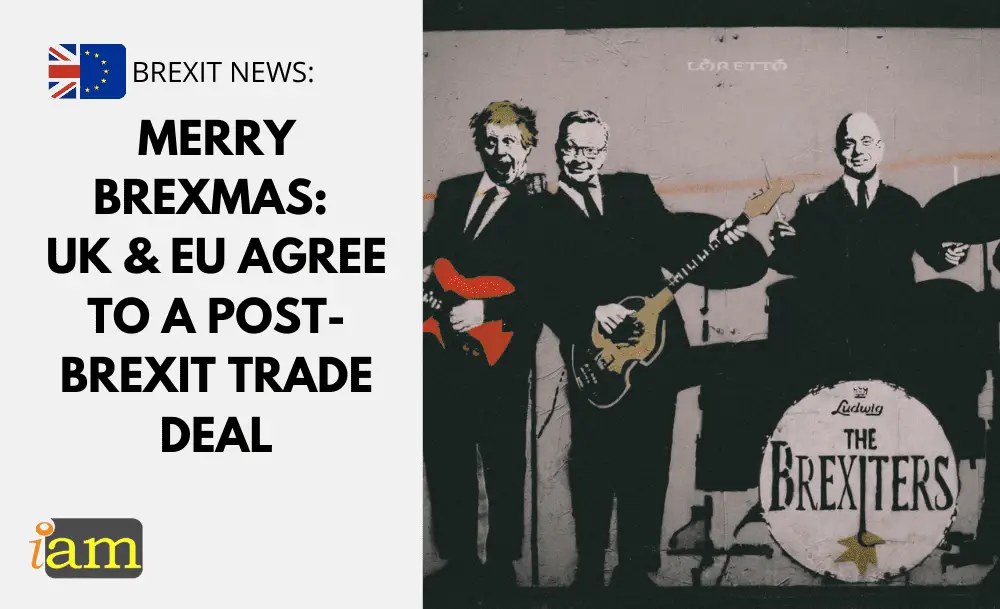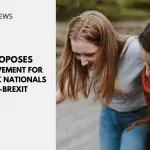Merry Brexmas: The UK & EU Agree a post-Brexit Trade Deal

EU-UK post-Brexit trade deal: What happens next
It’s been four and a half years since the UK voted to leave the EU. Its been a long process with which there were expectations that the UK will leave the EU without a trade deal. After months of negotiations, Britain and the EU have agreed a trade deal. But the details are still being worked out and negotiations will continue for years to come.
What we do know is that travel has changed forever, and services have been left out of an agreement. Therefore, it will not be as easy as it once once was to travel around Europe and provide services, or settle in another part of Europe.
It is not a so merry Brexmas for travellers and those that want to be free to settle or move anywhere in the European Union and the UK for its citizens.
Britain and the European Union agreed to a free trade agreement yesterday, a week before the transition period was due to end.
Now both the UK parliament and Europe must sign off on the deal.
What's next for the UK after the Brexit Trade Agreement?
MPs will be summoned back to parliament on December 30 to vote on the deal. The Labour leader Keir Starmer said the agreement was thin, but it was better than no deal at all.
What’s next for the EU After the Brexit Agreement?
The European Commission is sending the draft text to the remaining 27 European member states. The EU's chief Brexit negotiator is set to brief EU ambassadors today in an extraordinary meeting.
Because of the short time frame, the EU parliament will not be able to fully ratify the agreement until next year.
What Changes on January 1st?
Citizens of the UK and EU will no longer be able to enjoy free movement to live, work and study between the two areas.
UK nationals travelling to the EU's Schengen passport-free zone can only stay for 90 days in every 180-day period. EU nationals can visit the UK for up to 180 days, under current UK visit visa rules.
Here's how they compromised and what will change.
Fishing rights
London and Brussels agreed to a five-and-a-half-year transition period on fisheries. Here the UK will get increased access to its own waters whilst there will be reduced access for EU countries.
Law enforcement
Despite not wanting to do so, the UK has agreed to stay in the European Convention of Human Rights so that standards on both sides of the Channel on the issue remain the same.
The UK will also lose access to the Schengen Information System (SIS). The SIS is the largest information sharing system for security and border management in Europe. Nonetheless, both sides will continue to share Passenger Name Records from airlines and Prum, a cross border database of DNA and fingerprints.
Dispute resolution mechanism
The UK got its wish and will no longer be under the jurisdiction of the European Court of Justice. Independent arbitration will be sought whenever there is a disagreement.
Free Movement Agreements
Visas will now be required for stays over 90 days, which means Britons can no longer freely move to the EU to live, work or study and vice versa.
Trade
There will be “zero tariffs and zero quotas on all goods that comply with the appropriate rules of origin”, so in that respect, not much changes. Except, there will be extra checks at borders, such as safety checks and customs declarations.
But this doesn't apply to services. The UK's summary of the deal states that “the Agreement significantly builds on the Parties' commitments under WTO (World Trade Organisation) rules and locks in market access across substantially all sectors.”
Temporary Entry and Stay for Business Purposes
The Agreement allows for travel by the UK and EU business persons. The provisions give UK firms and individuals to engage in business activity and deliver services in the EU when the transition period ends.
The agreement allows for:
- Short-term business visitors
- business visitors for establishment purposes
- intra-corporate transferees
- contractual service suppliers
- and independent professionals,
to travel and not have market access restrictions or discriminatory barriers on business persons falling into these categories.
Business visitors also fall in line with already agreed European visit and tourism travel requirements and arrangements. This includes the ability for UK short-term business visitors to travel to the EU for 90 days in any 180-day month period. With EU nationals having 180 days to enter into the UK. But with the UK also losing access to SIS, the provisions mean that UK travellers will face delays at the borders.
Each side has agreed not to impose work permits on business visitors for establishment purposes. But there seems to be some form of an understanding to facilitate the easing of burdens on future visa and work permit applicants.
It guarantees that intra-corporate transferees can be accompanied by their partners and dependents when placed abroad, with minimal administrative burdens.
It may mean that in future, the EU and the UK may facilitate some form of easing of visa and travel requirements between the two parties.
Mutual Recognition of Professional Qualifications
The UK and the EU have agreed a framework for the recognition of qualifications between the Parties
From early 2021, the UK government will provide help and guidance to UK regulatory authorities and professional bodies to help them benefit from these provisions as well as other recognition paths. These provisions can be changed at any time with the agreement of both parties. Agreements will be negotiated on a profession-by-profession basis
Legal Services
The Agreement will give UK solicitors, barristers and advocates the right to advise their clients across the EU on UK and public international law using their home professional titles, except where EU Member States have placed specific limits on this activity.
Where EU Member States require UK lawyers to register in order to provide advice on UK and public international law, the Agreement makes clear this cannot mean requalification or admission to the local legal profession.
Erasmus
Britain withdrew from the Erasmus student exchange programme. The UK has instead announced the launch of a new scheme, named after mathematician and wartime code-breaker Alan Turing.
The student routes for EU nationals after Brexit have already been outlined and changed. Whereas, to study in the EU, you will need to meet the national requirements of each country individually.
Social Security Coordination
If either party’s citizens move between the UK and the EU after 31 December 2020, their social security position in respect of certain important benefits, like pensions and healthcare, are protected. Individuals will be able to have access to a range of social security benefits, including reciprocal healthcare cover and an uprated state pension.
Cross-border workers and their employers are only liable to pay social security contributions in one state at a time. Generally, this will be in the country where work is undertaken, irrespective of whether the worker resides within the EU or the UK, or indeed whether the employer is based in the EU or the UK.
The UK and EU Member States will be able to take into account relevant contributions paid into each other’s social security systems, or relevant periods of work or residence, by individuals for determining entitlement to a state pension and to a range of benefits. This will provide a good level of protection for people working in the UK and EU Member States. The Protocol also provides for the uprating of the UK State Pension paid to pensioners who retire to the EU.
On healthcare, the EHIC will be back in play. Where the UK or an EU Member State is responsible for the healthcare of an individual, they will be entitled to reciprocal healthcare cover. This includes certain categories of cross-border workers and state pensioners who retire to the UK or to the EU.
In addition, the Protocol will ensure necessary healthcare provisions continue simoilar to those provided by the European Health Insurance Card (EHIC) scheme. This means individuals who are temporarily staying in another country, for example a UK national who is in an EU Member State for a holiday, will have their necessary healthcare needs met for the period of their stay.
It also protects the ability of individuals to seek authorisation to receive planned medical treatment in the UK or the EU, funded by their responsible State.
UK prime minister Boris Johnson hailed the agreement with the EU as a “comprehensive Canada-style free trade deal”
The Commission has released an infographic detailing what else will change come December 31.
What are your thoughts on the new Brexit trade deal? Does it go far enough or is it too much? Comment below.
IaM can help with your visa application to the United States, the UK & other countries
If you need help with a US visa, a UK Visa, or visa to Europe, including help with appointment booking obligations, IaM can help. For more information and advice on US immigration, UK immigration law and US visa applications or if you need any help or assistance please, reach out to your Visa Coordinator at IaM.
- New Immigration Statistics for Year Ending December 2024 - 19 March 2025
- The Conservative’s New UK Immigration Plan – What You Need to Know - 7 February 2025
- How to apply for an adult dependant relative visa to come to the UK - 22 March 2023








